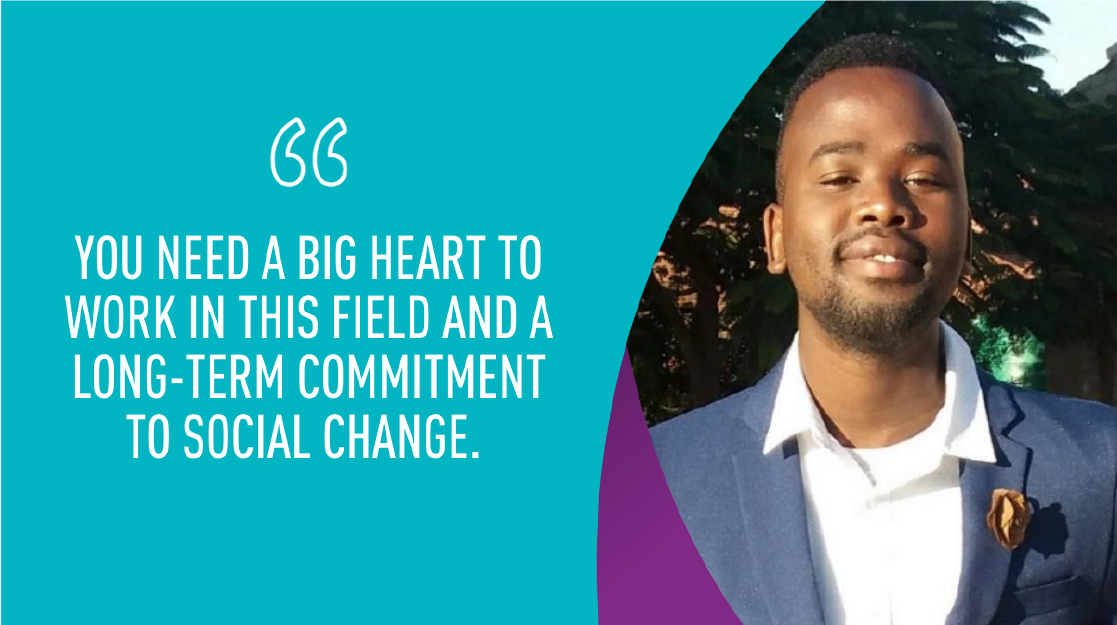From being role models in their workplaces to mentoring current Dell Young Leaders students, our programme alumni are on paths to give back to and transform their communities. The programme is also home to alumni who give back full-time in the world of work, with careers in social impact.
Hear more from alum Pontsho, who graduated with a Bachelor of Social Work (Honors) degree and now works in corporate social responsibility. Pontsho grew up in rural Mokopane, is the first in his family to obtain a university degree, and currently works as a corporate social responsibility coordinator.
Can you tell us about a day in your life as a corporate social responsibility coordinator?
I run and implement projects for the office and within the community in line with the organisation’s social impact strategy. It is definitely a varied role! This can include providing a platform for staff to go into underprivileged communities and do good work or organizing engaging fundraising initiatives. I am also responsible for tracking and recording grants and donations received from NGOs, universities, government institutions, or partner organisations.
I facilitate inductions where I introduce new employees to what the division is doing, so they are aware of platforms to portray a stronger sense of citizenship and encourage them to do good in their communities. I also compile reports for the Social and Ethics Committee and go through protocols from partner organisations to drive social and economic development in underprivileged communities.
What are some challenges you faced, and how do you recommend students prepare themselves for these challenges now?
My role involves working with many stakeholders and looking after different needs. Students who graduate with my degree should know that as a social worker you might work with psychologists, teachers, doctors, and many other professions. Across social impact, working in partnership with others is important. Having the ability to handle and work with external stakeholders is a great thing to start practicing as a student. Look out for ways you can develop your people skills. Sometimes it can be difficult to grasp or practice but these skills will get you far, especially the ability to listen before you talk and good communication skills.
What made you decide to follow this career path?
I did social work as my degree and had a chance to work in a primary school for my practicum in the youth center. When I graduated, I decided to move to more of a community development field. Although I’m not practicing social work at the moment, I can still find ways to make an impact within underprivileged communities in South Africa – such as the role I have today.
How did you leverage your degree in your workplace?
While I’m not practicing social work at the moment, in any social impact environment I recommend working on leadership and initiative skills. In social work, you are taught to be professional and to have a good work ethic, which are very important. A colleague of mine gave me feedback that I have a good work ethic, and I do that by trying to stay focused, motivated, and always ensuring that I complete tasks in a timely manner.
What advice would you have for someone joining the social impact sector?
The work can be difficult at times, such as when you work with children from very underprivileged communities and it’s best to not to let your emotions show. A strong mindset and positive attitude make it easy to deal with these challenges. If you have any difficulties at work, communicate with your manager in advance, especially if you can’t complete the task. Communicating ahead of time shows you have a good work ethic and are focused on delivering impact, despite the challenges.
You need a big heart to work in this field and a long-term commitment to social change. Be authentic. Have passion for the work that is being done. Be resilient and self-driven.
The Career Insights Series is designed to help graduate job seekers. Dell Young Leaders alumni share insights on their career path, highlight a day in the life at their employer, and provide guidance to students on how to stand out to employers and prepare for the world of work.

